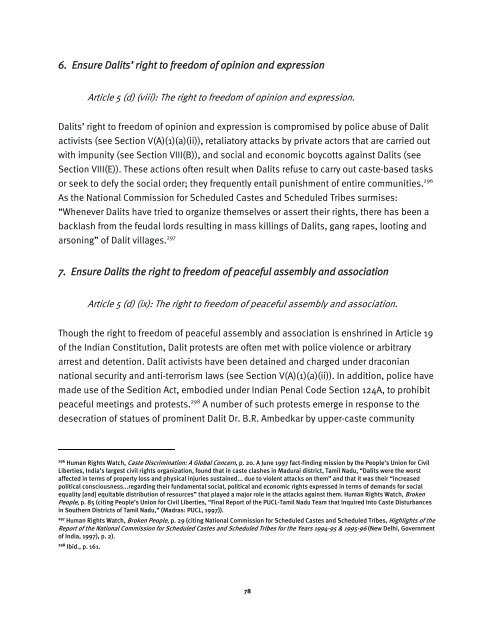Caste Discrimination against India's âUntouchablesâ - Human Rights ...
Caste Discrimination against India's âUntouchablesâ - Human Rights ...
Caste Discrimination against India's âUntouchablesâ - Human Rights ...
You also want an ePaper? Increase the reach of your titles
YUMPU automatically turns print PDFs into web optimized ePapers that Google loves.
6. Ensure Dalits’ right to freedom of opinion and expression<br />
Article 5 (d) (viii): The right to freedom of opinion and expression.<br />
Dalits’ right to freedom of opinion and expression is compromised by police abuse of Dalit<br />
activists (see Section V(A)(1)(a)(ii)), retaliatory attacks by private actors that are carried out<br />
with impunity (see Section VIII(B)), and social and economic boycotts <strong>against</strong> Dalits (see<br />
Section VIII(E)). These actions often result when Dalits refuse to carry out caste-based tasks<br />
or seek to defy the social order; they frequently entail punishment of entire communities. 296<br />
As the National Commission for Scheduled <strong>Caste</strong>s and Scheduled Tribes surmises:<br />
“Whenever Dalits have tried to organize themselves or assert their rights, there has been a<br />
backlash from the feudal lords resulting in mass killings of Dalits, gang rapes, looting and<br />
arsoning” of Dalit villages. 297<br />
7. Ensure Dalits the right to freedom of peaceful assembly and association<br />
Article 5 (d) (ix): The right to freedom of peaceful assembly and association.<br />
Though the right to freedom of peaceful assembly and association is enshrined in Article 19<br />
of the Indian Constitution, Dalit protests are often met with police violence or arbitrary<br />
arrest and detention. Dalit activists have been detained and charged under draconian<br />
national security and anti-terrorism laws (see Section V(A)(1)(a)(ii)). In addition, police have<br />
made use of the Sedition Act, embodied under Indian Penal Code Section 124A, to prohibit<br />
peaceful meetings and protests. 298 A number of such protests emerge in response to the<br />
desecration of statues of prominent Dalit Dr. B.R. Ambedkar by upper-caste community<br />
296<br />
<strong>Human</strong> <strong>Rights</strong> Watch, <strong>Caste</strong> <strong>Discrimination</strong>: A Global Concern, p. 20. A June 1997 fact-finding mission by the People’s Union for Civil<br />
Liberties, India’s largest civil rights organization, found that in caste clashes in Madurai district, Tamil Nadu, “Dalits were the worst<br />
affected in terms of property loss and physical injuries sustained... due to violent attacks on them” and that it was their “increased<br />
political consciousness...regarding their fundamental social, political and economic rights expressed in terms of demands for social<br />
equality [and] equitable distribution of resources” that played a major role in the attacks <strong>against</strong> them. <strong>Human</strong> <strong>Rights</strong> Watch, Broken<br />
People, p. 85 (citing People’s Union for Civil Liberties, “Final Report of the PUCL-Tamil Nadu Team that Inquired Into <strong>Caste</strong> Disturbances<br />
in Southern Districts of Tamil Nadu,” (Madras: PUCL, 1997)).<br />
297<br />
<strong>Human</strong> <strong>Rights</strong> Watch, Broken People, p. 29 (citing National Commission for Scheduled <strong>Caste</strong>s and Scheduled Tribes, Highlights of the<br />
Report of the National Commission for Scheduled <strong>Caste</strong>s and Scheduled Tribes for the Years 1994-95 & 1995-96 (New Delhi, Government<br />
of India, 1997), p. 2).<br />
298<br />
Ibid., p. 161.<br />
78

















